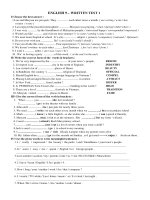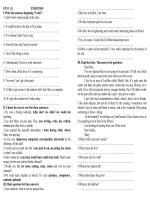Bai 16 - English 9
Bạn đang xem bản rút gọn của tài liệu. Xem và tải ngay bản đầy đủ của tài liệu tại đây (1.03 MB, 50 trang )
UNIT 16
English 8
INVENTIONS
UNIT 16
English 8
1. Getting started
2. Speaking
3. Reading
4. Writing
5. Practice test
INVENTIONS
Getting started
What do you know about the invention of paper?
Getting started
What do you know about the invention of paper?
Getting started
What do you know about the invention of paper?
Five thousand years ago, the
Egyptians wrote on a plants.
Getting started
What do you know about the invention of paper?
Getting started
What do you know about the invention of paper?
A Chinese official made paper
from wood pulp in the year
105.
Getting started
What do you know about the invention of paper?
Getting started
What do you know about the invention of paper?
The Japanese learn how to
make paper from Chinese
prisoners.
Getting started
What do you know about the invention of paper?
Getting started
What do you know about the invention of paper?
In 768, Arabs learned about
papermaking from Chinese
prisoners.
Getting started
What do you know about the invention of paper?
Getting started
What do you know about the invention of paper?
The first papermaking
machine was invented
in the late 1700s by a
French man.
Speaking
Look at the table. Practise asking and answer
questions about inventions
Look at the table. Practise asking and answer
questions about inventions
facsimile 1816 Alexander Bain
microphone 1878 D.E. Hughes
loudspeakers 1924 C.W. Rice
helicopter 1939 Igor Sikorsky
colour television 1950 P.C. Goldmark
laser 1958 Gordon Gould
facsimile 1816 Alexander Bain
microphone 1878 D.E. Hughes
loudspeakers 1924 C.W. Rice
helicopter 1939 Igor Sikorsky
colour television 1950 P.C. Goldmark
laser 1958 Gordon Gould
Speaking
Look at the table. Practise asking and answer
questions about inventions
Look at the table. Practise asking and answer
questions about inventions
When was _____ invented?
By whom was
_____
invented?
Reading
Read the passage carefully.
Read the passage carefully.
Our century has seen great changes in the life and living
conditions of people. Less than hundred years ago, many of
the things that we do now seemed impossible. No one could
imagine that people could fly, or that we could listen to our
friends thousands of miles away.
Today, radio and television serve many purposes besides
pleasure and entertainment. They help us to find fish in the
sea and to land airplanes in bad weather or at night. They
control the work of large numbers of machines in industry,
and hold spaceship in their orbits.
Our century has seen great changes in the life and living
conditions of people. Less than hundred years ago, many of
the things that we do now seemed impossible. No one could
imagine that people could fly, or that we could listen to our
friends thousands of miles away.
Today, radio and television serve many purposes besides
pleasure and entertainment. They help us to find fish in the
sea and to land airplanes in bad weather or at night. They
control the work of large numbers of machines in industry,
and hold spaceship in their orbits.
Click here to zoom in
Our century has seen great changes in the life and
living conditions of people. Less than hundred years
ago, many of the things that we do now seemed
impossible. No one could imagine that people could
fly, or that we could listen to our friends thousands of
miles away.
Today, radio and television serve many purposes
besides pleasure and entertainment. They help us to
find fish in the sea and to land airplanes in bad
weather or at night. They control the work of large
numbers of machines in industry, and hold
spaceship in their orbits.
Our century has seen great changes in the life and
living conditions of people. Less than hundred years
ago, many of the things that we do now seemed
impossible. No one could imagine that people could
fly, or that we could listen to our friends thousands of
miles away.
Today, radio and television serve many purposes
besides pleasure and entertainment. They help us to
find fish in the sea and to land airplanes in bad
weather or at night. They control the work of large
numbers of machines in industry, and hold
spaceship in their orbits.
Reading
1. _______ Our life and living conditions have
changed greatly.
2. _______ We have made many dreams in the
past come true.
3. _______ A hundred years ago, people could fly.
4. _______ Radio and TV serve only few
purposes in modern life.
1. _______ Our life and living conditions have
changed greatly.
2. _______ We have made many dreams in the
past come true.
3. _______ A hundred years ago, people could fly.
4. _______ Radio and TV serve only few
purposes in modern life.
Are these statements TRUE or FALSE?
Are these statements TRUE or FALSE?
Reading
1. _______ Our life and living conditions have
changed greatly.
2. _______ We have made many dreams in the
past come true.
3. _______ A hundred years ago, people could fly.
4. _______ Radio and TV serve only few
purposes in modern life.
1. _______ Our life and living conditions have
changed greatly.
2. _______ We have made many dreams in the
past come true.
3. _______ A hundred years ago, people could fly.
4. _______ Radio and TV serve only few
purposes in modern life.
Are these statements TRUE or FALSE?
Are these statements TRUE or FALSE?
TRUE
FALSE
FALSE
Reading
Fill in the gap with a suitable word.
Fill in the gap with a suitable word.
Our century has ___ great changes in the life and living
conditions of people. Less than hundred years ago, many of
the things that we do now seemed ___. No one could ____
that people could fly, or that we could listen to our friends
thousands of miles ____.
Today, radio and television serve many _____ besides
pleasure and entertainment. They help us to find fish in the
sea and to land airplanes in bad _____ or at night. They
_____ the work of large numbers of machines in industry,
and hold spaceship in their _____.
Our century has ___ great changes in the life and living
conditions of people. Less than hundred years ago, many of
the things that we do now seemed ___. No one could ____
that people could fly, or that we could listen to our friends
thousands of miles ____.
Today, radio and television serve many _____ besides
pleasure and entertainment. They help us to find fish in the
sea and to land airplanes in bad _____ or at night. They
_____ the work of large numbers of machines in industry,
and hold spaceship in their _____.
Click here to zoom in









